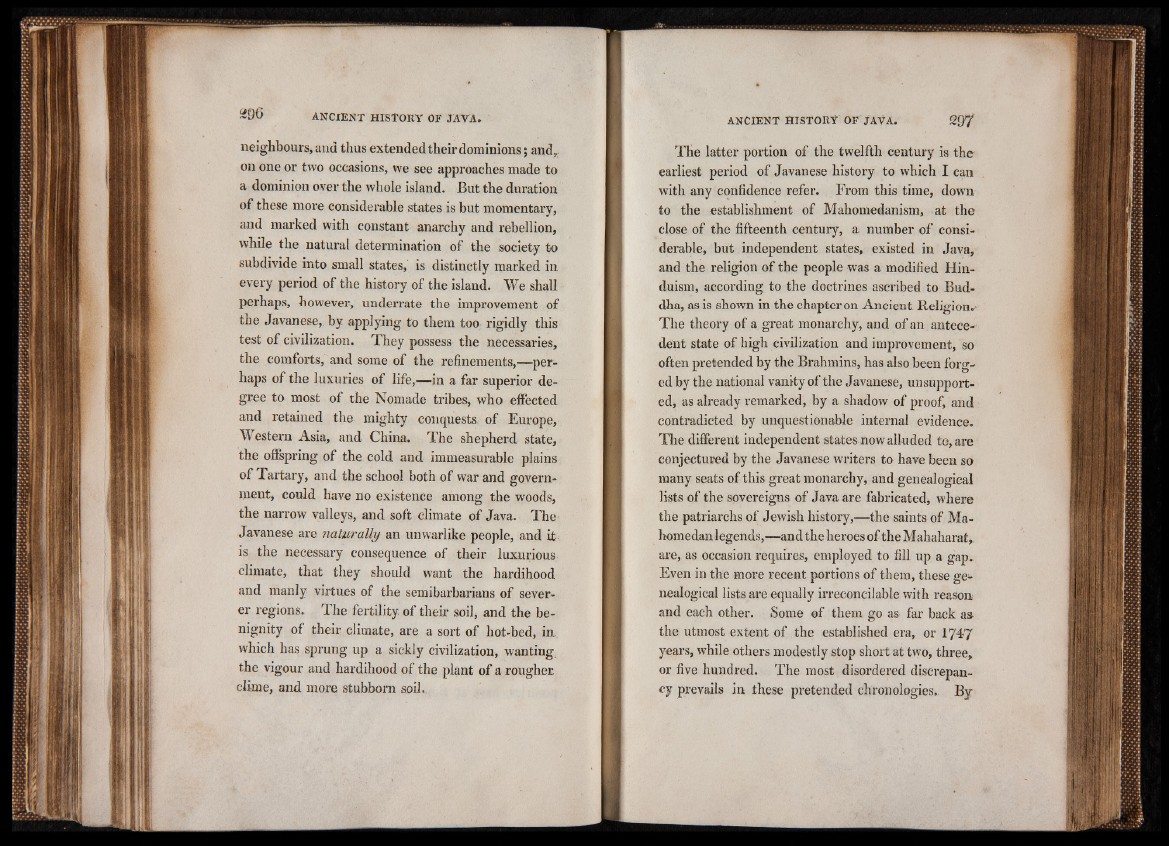
neighbours, and thus extended their dominions; and,,
on one or two occasions, we see approaches made to
a dominion over the whole island. JBut the duration
of these more considerable states is but momentary,
and marked with constant anarchy and rebellion,
while the natural determination of the society to
subdivide into small states, is distinctly marked in
every period of the history of the island. We shall
perhaps, however, underrate the improvement of
the Javanese, by applying to them too rigidly this
test of civilization. They possess the necessaries,
the comforts, and some of the refinements,—perhaps
of the luxuries of life,—in a far superior degree
to most of the Nomade tribes, who effected
and retained the mighty conquests of Europe,
Western Asia, and China. The shepherd state,
the offspring of the. cold and immeasurable plains
of Tartary, and the school both of war and government,
could have no existence among the woods,
the narrow valleys, and soft climate of Java. The
Javanese are naturally an unwarlike people, and it
is the necessary consequence of their luxurious
climate, that they should want the hardihood
and manly virtues of the semibarbarians of severer
regions. The fertility of their soil, and the benignity
of their climate, are a sort of hot-bed, in.
which has sprung up a sickly civilization, wanting
the vigour and hardihood of the plant of a rougher
clime, and more stubborn soil.
The latter portion of the twelfth century is the
earliest period of Javanese history to which I can
with any confidence refer. From this time, down
to the establishment of Mahomedanism, at the
close of the fifteenth century, a number of considerable,
but independent states, existed in Java,
and the religion of the people was a modified Hinduism,
according to the doctrines ascribed to Buddha,
as is shown in the chapter on Ancient Religion.'
The theory of a great monarchy, and of an antecedent
state of high civilization and improvement, so
often pretended hy the Brahmins, has also been forged
by the national vanity of the Javanese, unsupported,
as already remarked, by a shadow of proof, and
contradicted by unquestionable internal evidence.
The different independent states now alluded to, are
conjectured by the Javanese writers to have been so
many seats of this great monarchy, and genealogical
lists of the sovereigns of Java are fabricated, where
the patriarchs of Jewish history,—the saints of Ma-
homedan legends,—and the heroes of the Mahaharat,
are, as occasion requires, employed to fill up a gap.
Even in the more recent portions of them, these ge*-
nealogical lists are equally irreconcilable with reason
and each other. Some of them go as far back a»
the utmost extent of the established era, or 1747
years, while others modestly stop short at two, three,
or five hundred. The most disordered discrepancy
prevails in these pretended chronologies. By